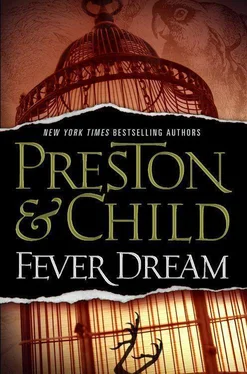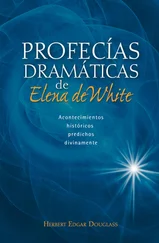Douglas Child - Fever Dream
Здесь есть возможность читать онлайн «Douglas Child - Fever Dream» весь текст электронной книги совершенно бесплатно (целиком полную версию без сокращений). В некоторых случаях можно слушать аудио, скачать через торрент в формате fb2 и присутствует краткое содержание. Жанр: Триллер, на английском языке. Описание произведения, (предисловие) а так же отзывы посетителей доступны на портале библиотеки ЛибКат.
- Название:Fever Dream
- Автор:
- Жанр:
- Год:неизвестен
- ISBN:нет данных
- Рейтинг книги:3 / 5. Голосов: 1
-
Избранное:Добавить в избранное
- Отзывы:
-
Ваша оценка:
- 60
- 1
- 2
- 3
- 4
- 5
Fever Dream: краткое содержание, описание и аннотация
Предлагаем к чтению аннотацию, описание, краткое содержание или предисловие (зависит от того, что написал сам автор книги «Fever Dream»). Если вы не нашли необходимую информацию о книге — напишите в комментариях, мы постараемся отыскать её.
Fever Dream — читать онлайн бесплатно полную книгу (весь текст) целиком
Ниже представлен текст книги, разбитый по страницам. Система сохранения места последней прочитанной страницы, позволяет с удобством читать онлайн бесплатно книгу «Fever Dream», без необходимости каждый раз заново искать на чём Вы остановились. Поставьте закладку, и сможете в любой момент перейти на страницу, на которой закончили чтение.
Интервал:
Закладка:

20
St. Francisville, Louisiana
D'AGOSTA PULLED UP IN FRONT OF THE WHITEWASHED mansion, rising in airy formality from dead flower beds and bare-branched trees. The winter sky spat rain, puddles collecting on the blacktop. He sat in the rental car for a moment, listening to the last lousy lines of "Just You and I" on the radio, trying to overcome his annoyance at having been sent on what was hardly more than an errand. What the hell did he know about dead birds?
Finally, as the song faded away, he heaved himself from his seat, grabbed an umbrella, and stepped out of the car. He climbed the steps of Oakley Plantation House and entered the gallery: a porch with jalousie windows shut against the steady rain. Shoving his dripping umbrella into a stand, he shrugged off his raincoat, hung it on a rack, and entered the building.
"You must be Dr. D'Agosta," said a bright, bird-like woman, rising from her desk and bustling toward him on stubby legs, sensible shoes rapping the boards. "We don't get many visitors this time of year. I'm Lola Marchant." She stuck out her hand.
D'Agosta took the hand and was given a surprisingly vigorous shake. The woman was all rouge and powder and lipstick, and she had to be at least sixty, stout and vigorous.
"Shame on you, bringing this bad weather!" She broke into a warbling laugh. "Even so, we always welcome Audubon researchers. Mostly we get tourists."
D'Agosta followed her into a reception hall, done up in white-painted wood and massive beams. He began to regret the cover he had given her over the phone. So little did he know about Audubon or birds, he felt sure he'd be busted on even the most minimal exchange of information. Best thing to do was keep his mouth shut.
"First things first!" Marchant went behind another desk and pushed an enormous logbook toward him. "Please sign your name and fill in the reason for your visit."
D'Agosta wrote down his name and the supposed reason.
"Thank you!" she said. "Now, let's get started. What, exactly, would you like to see?"
D'Agosta cleared his throat. "I'm an ornithologist"--he got the word out perfectly--"and I'd like to see some of Audubon's specimens."
"Wonderful! As you surely know, Audubon was only here for four months, working as a drawing master for Eliza Pirrie, the daughter of Mr. and Mrs. James Pirrie, owners of the Oakley Plantation. After a tiff with Mrs. Pirrie he abruptly went back to New Orleans, taking with him all his specimens and drawings. But when we became a State Historic Site forty years ago, we were given a bequest of Audubon drawings, letters, and some of his actual bird specimens, which we've added to over the years--and now we have one of the finest Audubon collections in Louisiana!"
She smiled brightly at this recital, her bosom heaving slightly from the effort.
"Right," mumbled D'Agosta, removing a steno notebook from his brown suit coat, hoping it added verisimilitude.
"This way, Dr. D'Agosta, please."
Dr. D'Agosta . The lieutenant felt his apprehension increase.
The woman pounded her way across the painted pine floors to a set of stairs. They ascended to the second floor and walked through a large series of spacious rooms, furnished in period furniture, finally arriving at a locked door, which--when opened--revealed a set of attic stairs, steep and narrow. D'Agosta followed Marchant to the top. It was an attic in name only, being spotlessly clean and well kept, smelling of fresh paint. Old oaken cabinets with rippled glass lined three of the walls, with more modern, closed cabinets at the far end. The light came from a series of dormers with frosted windows, which let in a cool white light.
"We have about a hundred birds from Audubon's original collection," she said, walking briskly down the central corridor. "Unfortunately, Audubon was not much of a taxidermist. The specimens have been stabilized, of course. Here we are."
They stopped before a large, gray metal cabinet that looked almost like a safe. Marchant spun the center dial and turned the lever handle. With a sigh of air, the great door opened, revealing inner wooden cabinets with labels, stuck into brass label-holders, screwed to every drawer. A stench of mothballs washed over D'Agosta. Grasping one drawer, Marchant drew it out to display three rows of stuffed birds, yellowed tags around each claw, white cotton-wool poking out of their eyes.
"Those tags are Audubon's originals," said Marchant. "I'll handle the birds myself--please don't touch them without my permission. Now!" She smiled. "Which ones would you like to see?"
D'Agosta consulted his notebook. He had copied down some bird names from a website that listed all of Audubon's original specimens and their locations. Now he trotted them out. "I'd like to start with the Louisiana Water Thrush."
"Excellent!" The drawer slid in and another was pulled out. "Do you want to examine it on the table or in the drawer?"
"Drawer is fine." D'Agosta pushed a loupe into his eye and studied the bird closely with many grunts and mutterings. It was a ragged-looking thing, the feathers askew or missing, stuffing coming out. D'Agosta made what he hoped was a show of concentration, pausing to jot unintelligible notes.
He straightened. "Thank you. The American Goldfinch is the next on my list."
"Coming right up."
He made another show of examining the bird, squinting at it through the loupe, taking notes, talking to himself.
"I hope you're finding what you're looking for," said Marchant, with a leading tone in her voice.
"Oh, yes. Thank you." This was already getting tiresome, and the smell of mothballs was making him sick.
"Now--" He pretended to consult his notebook. "--I'll look at the Carolina Parrot."
A sudden silence. D'Agosta was surprised to see Marchant's face reddening slightly. "I'm sorry, we don't have that specimen."
He felt an additional wash of annoyance: they didn't even have the specimen he'd come for. "But it's in all the reference books as being here," he said, more crossly than he intended. "In fact, it says you have two of them."
"We don't have them anymore."
"Where are they?" he said, with open exasperation.
There was a long silence. "I'm afraid they disappeared."
"Disappeared? Lost?"
"No, not lost. Stolen. Many years ago, when I was just an assistant. All that remain are a few feathers."
Suddenly D'Agosta was interested. His cop radar went off big-time. He knew, right away, that this wasn't going to be a wild goose chase after all. "Was there an investigation?"
"Yes, but it was perfunctory. It's hard to get the police excited about two stolen birds, even if they are extinct."
"Do you have a copy of the old report?"
"We keep very good files here."
"I'd like to see it."
He found the woman looking at him curiously. "Excuse me, Dr. D'Agosta--but why? The birds have been gone for more than a dozen years."
D'Agosta thought fast. This changed the game. He made a quick decision, dipped into his pocket, and brought out his shield.
"Oh, my." She looked at him, her eyes widening. "You're a policeman. Not an ornithologist."
D'Agosta put it away. "That's right, I'm a lieutenant detective with NYPD homicide. Now be a dear and go get that file."
She nodded, hesitated. "What's it about?"
D'Agosta looked at her and noted a thrill in her eyes, a certain suppressed excitement. "Murder, of course," he said with a smile.
She nodded again, rose. A few minutes later she returned with a slender manila folder. D'Agosta opened it to find the most cursory of police reports, a single scribbled paragraph that told him nothing except that a routine check of the collection revealed the birds were missing. No sign of break-in, nothing else taken, no evidence collected at the scene, no fingerprints dusted, and no suspects named. The only useful thing was the time frame of the crime: it had to have occurred between September 1 and October 1, as the collection was inventoried once a month.
Читать дальшеИнтервал:
Закладка:
Похожие книги на «Fever Dream»
Представляем Вашему вниманию похожие книги на «Fever Dream» списком для выбора. Мы отобрали схожую по названию и смыслу литературу в надежде предоставить читателям больше вариантов отыскать новые, интересные, ещё непрочитанные произведения.
Обсуждение, отзывы о книге «Fever Dream» и просто собственные мнения читателей. Оставьте ваши комментарии, напишите, что Вы думаете о произведении, его смысле или главных героях. Укажите что конкретно понравилось, а что нет, и почему Вы так считаете.











